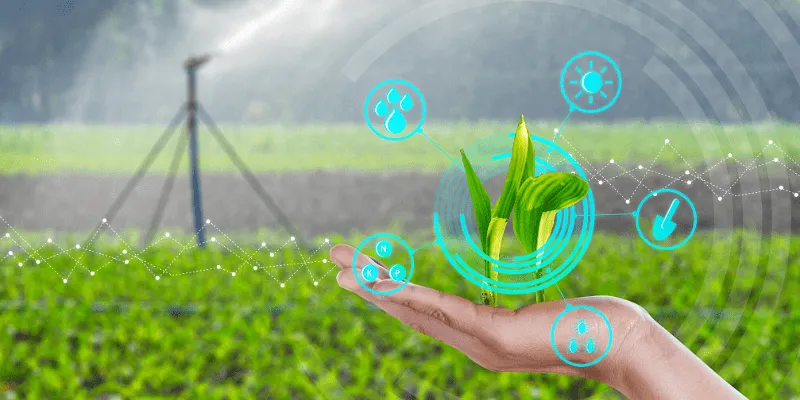India gets third-largest agritech funding; can drive close to $35B for agri products by 2025: Bain & Co report
A Bain & Co report states that agritech and agri- ecosystem sectors have received significant interest from the investor community, making India the third-largest country in terms of agritech funding and the number of agritech startups.
A Bain & Co report stated that agritech and agri-ecosystem sectors have received significant interest from the investor community, making India the third-largest country in terms of agritech funding and the number of agritech startups.
It added there are several estimates which indicate that approximately $30–$35 billion of the value pool will be created in agri-logistics, offtake, and agri-input delivery by 2025.
The report stated between 2017 and 2020, India received about $1 billion in agritech funding. The top deals in agriculture were investments into companies like Ninjacart, AgroStar, Mahyco Grow, Husk, WayCool Foods and Products, Jumbotail, Vahdam, and DeHaat (Green AgRevolution). Based on the discernable changes in the sector, investments in agritech over the next four to five years are poised to increase significantly.

Image Source: Shutterstock
Parijat Jain, Partner and leader of Bain’s agribusiness practice in India, said,
“Indian agriculture is at an inflection point. The $370 billion sector will undergo a complete transformation in the coming years on the back of significant technology interventions, regulatory support and behavioral changes across consumers and farmers. Digital disruption across the agricultural and agritech value chain is enabling ‘uberisation’ of services, converting capital investment assets to pay- per-use models and creating online communities along with online input and output marketplaces.”
It stated that close to 55 percent of the Indian population still depends on agriculture for their livelihood.
The report outlines an approach to reinvent Indian agriculture that is adapted for the changing times—organisations can maximise their current business potential by becoming cheaper, better, faster, broader, and greener.
The report stated —
a. The Indian agriculture sector is at the cusp of a disruption based on — technology, regulation, investment, and stakeholder behavioural changes across consumers to farmers.
b. The idea of doubling farmer incomes in the next few years is likely to become a reality.
c. Agriculture’s contribution to the country’s gross value added (GVA) is about 20 percent, however, it continues to be dominated by small and marginal landholdings.
Commenting on the report, Prashant Sarin, Partner and leader of the Advanced Manufacturing and Services, Energy and Natural Resources practices in Bain & Company, India said, “We are at a key moment when we can leapfrog from the traditional methods to a new, technology-friendly way of growing, processing, and selling food. The traditional form of agriculture will be disrupted and overhauled over time, and $30-35 billion value will be created in new value pools across the agricultural value chain, over the next few years.”
Upcoming reforms
The report added that the APMC reforms will enable corporates to buy directly from the farmer while the ECA reform incentivises investment in storage and transportation infrastructure, resulting in supply chain efficiencies. Firms can save five to 10 percent or more on procurement costs of food items through a concerted national strategy.
Technology is driving innovations in a variety of ways across the agricultural value chain. For example, insurance, credit rating, and loans are contributing to increased funding for this sector. In farming activities, weather prediction and smart crop management are leading to higher output while sensors and the Internet of Things (IoT) are enabling better tracking and visibility of farming activities.
Shalabh Singawne, Associate Partner and member of the Energy and Natural Resources, and Advanced Manufacturing and Services practices in Bain & Company, India said,
“Companies need to be ready to address the challenges in this journey of change while exploiting the opportunity it represents over the coming years. We will see significant value being created in the sector, and this is the best time for companies to invest and build their digital capabilities to exploit the opportunities that lie ahead."
At the macro level, there are three potential plays for companies in the agritech ecosystem:
a. Setting up an integrated and future-ready agritech platform by bringing together all the offerings across the value chain.
b. Set up a CoE and incubation wing for new business models and agritech startups through strategic investments and partnerships.
c. Digitally reinvent current businesses by identifying priority use cases that would complement the current businesses and capabilities. When implemented, these technological changes, capabilities and investments can fundamentally change the productivity and landscape of the sector.
"Bain believes that the life cycle of building an integrated platform will require sustained investment across multiple phases. A holistic digital platform would therefore include e-trading and an online marketplace; seamless supply chains; and smart farming and data-backed advice on risks and mitigation steps, such as short-term weather and long-term soil condition predictions," stated the report.
It stated that the future of agriculture is very important to India’s development, its policy planners, and other stakeholders. Reforming Indian agriculture is also critical from an environment, sustainability, and climate change perspective.
"We have only touched the tip of the iceberg. Companies and farmers are vital components in this value chain—one complements the other. We will be able to lift millions of farmers from subsistence farming and poverty, allowing them to become wealth creators. Increasingly, many young entrepreneurs are entering the agriculture start-up space. Adopting technology-friendly practices across the agricultural value chain is critical to transforming this critical sector of India’s economy," stated the report.
Edited by Kanishk Singh








